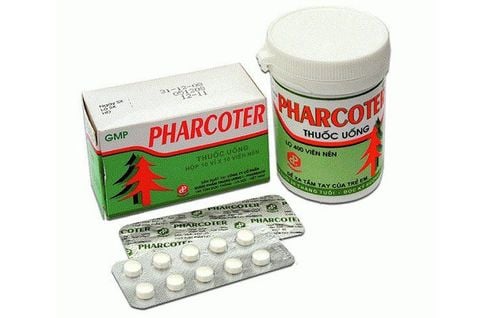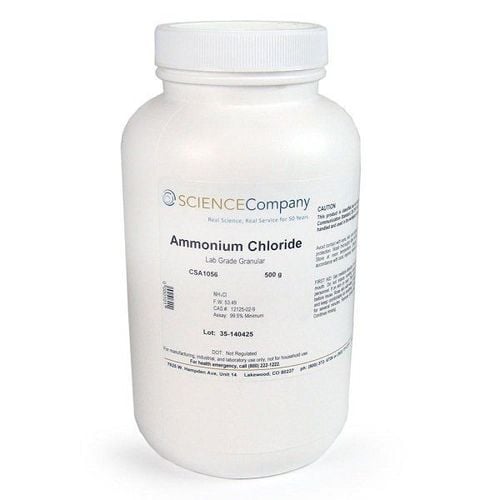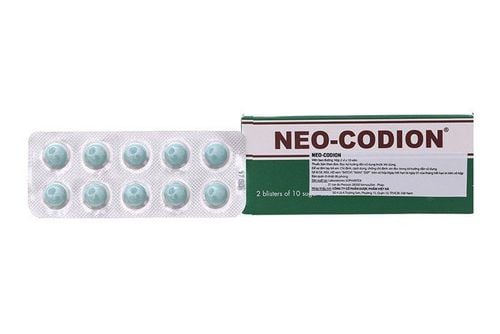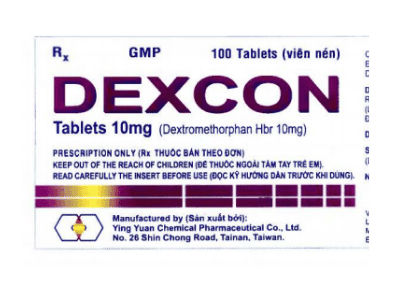This is an automatically translated article.
Noscapine belongs to the group of alkaloids that act on the respiratory tract. The drug is often used to treat the symptoms of a dry, non-sputum cough. Although side effects are uncommon when using Noscapin, patients should be aware and consult a doctor when taking this drug.1. Uses of Noscapin
Noscapin has an antitussive effect mainly mediated by its receptor agonist activity. The drug has a cough suppressant effect by acting on the cough center in the medulla oblongata, does not cause respiratory depression or addiction at therapeutic doses. The drug is usually indicated for the symptomatic treatment of non-productive cough and is contraindicated in the following cases:Children under 30 months of age, respiratory failure, cough due to bronchial asthma or a combination of both agonist and antagonist drugs morphine; Patients who are allergic to Noscapin or any of its ingredients.
2. Dosage of Noscapin
Depending on the subjects and treatment goals, the dose of Noscapin will be different, specifically as follows:
For adults:
Oral dose can be up to 50mg/ 3 times per day; Drink about 1 hour before meals; If the cough persists for more than 2 weeks, you need to see a doctor for a more specific examination. For children:
Infants over 6 months and under 3 years old: 7.5 mg x 2 times/day; Children from 3-12 years old: 25 mg/3 times/day; Children over 12 years: adult dose.
3. Noscapin side effects
In some patients when using Noscapin, side effects may occur such as:
Constipation; headache, drowsiness; Shortness of breath, chest pain; Respiratory disorders; Abdominal pain, nausea, vomiting; Urticaria, itching; Swelling of the face and neck (Quincke's edema); Dizziness, bronchospasm; Allergic skin reactions; Nervous system disorders; Severe abdominal, chest, or back pain like cramps.
4. Be careful when using Noscapin
Some notes when using Noscapin include:
Do not share Noscapin with expectorants or expectorants, should find out the cause of cough before using the drug for more specific treatment; If the patient is not effective with the usual dose of cough suppressant, the dose should not be increased; Taking Noscapine may increase the risk of intracranial hemorrhage due to hypertension; Co-administration of Noscapine with a morphine-antagonist agonist may reduce the effectiveness of Noscapin by competing for the receptor and increase the risk of withdrawal syndrome, so co-administration is contraindicated; Elderly people may experience respiratory failure when using Noscapin; In case of overdose, Noscapin can cause symptoms such as nausea, vomiting, dizziness, confusion, agitation, even coma, respiratory failure, convulsions. Some common drug interactions with Noscapin include:
Depressants acting on the central nervous system can increase the sedative effect, making it dangerous to drive and use machines; Co-administration of Noscapine with drugs that are both morphine agonists and antagonists may reduce the effectiveness of Noscapin by competing for the receptor; Noscapin may increase the anticoagulant effect of Warfarin, and should be used with caution. Above is some information about the uses, dosage and notes when using Noscapin, if you need advice or have any questions, please consult a qualified doctor / pharmacist subject for answers.
Please dial HOTLINE for more information or register for an appointment HERE. Download MyVinmec app to make appointments faster and to manage your bookings easily.













